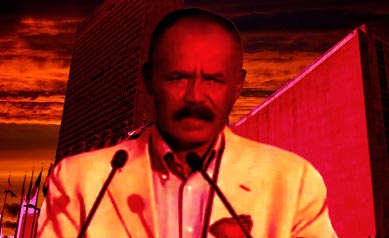Ethiopian PM Abiy Unscrambles The Algiers Agreement

The Algiers Agreement is a peace treaty, which came about after 29 months of bloodshed, displacement and negotiations between Eritrea and Ethiopia. Named after the city where it was signed, the Agreement was a culmination of several agreements—OAU’s Framework Agreement, Modalities for its Implementation–that the two parties inked while they were fighting. And part of the reason it took as long as it did (I would say the main reason) is because the Government of Ethiopia refused to have direct, face-to-face negotiations unless its preconditions were met. The first precondition was for Eritrea to withdraw from territories that Ethiopia would not name: its absurd position was “you know what they are, now pack and leave: then we will talk.” Since Ethiopia’s new Premiere has, in my view, completely unscrambled Ethiopia’s attitude to the Agreement, and since it has been so long (December 2000) that some may not have the proper context, it is useful to summarize what it says and try to explain what just happened and the scenarios going forward.
The Algiers Agreement Short
The Agreement is relatively short (only six pages) and it has five articles.
Article 1 says since you two have already signed a cessation of hostilities agreement six months ago, do not do anything to change that: don’t use force or the threat of force against each other. (Status: ignored by Eritrea and Ethiopia.)
Article 2 says comply with the Geneva Convention and, using the offices of ICRC, exchange prisoners of war and release, repatriate and return to their last place of residence the displaced civilians. (Status: we don’t know beyond what’s in the Claims Commission report)
Article 3 says “an independent, impartial body”, which will be appointed by the OAU (now AU), in consultation with the UN, Eritrea and Ethiopia, will conduct an investigation to determine the origins of the conflict. (Status: ignored)
Article 4 says a boundary commission (now known as Eritrea Ethiopia Boundary Commission or EEBC) will be set up at The Hague to render a decision in accordance with language the two parties agreed to in their previous accords (strictly on the basis of colonial treaties, applicable laws and without regard to what is “right” or “good”) and that this decision will be final and binding. (Status: concluded but rejected by Ethiopia)
Article 5 says a claims commission (now known as Eritrea Ethiopia Claims Commission or EECC) will be set up in The Hague to consider claims of both parties of the war damages the other party is alleged to have made and to render a decision (again without regard to what is “right or good”) which will also be final and binding. (Status: concluded, accepted but not implemented)
Since the 1998-2000 war between Eritrea and Ethiopia is defined as a border war (why a border dispute may degenerate into a shooting war is a completely different subject), then the heart of the Algiers Agreement is Article 4: the boundary commission. But it is not the entirety of it. (I will come back to that later.)
Hurry Up And Wait
There was supposed to be one building block agreement to the Framework Agreement and Modalities. And there was. It was called the Technical Arrangements. This was a sequence of events designed to temporarily undo Eritrea’s foray into Badme on May 6, 1998 and Ethiopia taking it back on February 6, 1999. Both parties agreed in advance that they will trust the judgment of the OAU and UN-provided experts on how the two parties should re-deploy their troops: an independent commission (whose decision would be binding but without prejudicing the final fate of the places the two parties are withdrawing from) would make its decision within three weeks of the date of the signing of the Technical Arrangement (August 31, 1999.) Eritrea instantly signed it. For seven months, the Government of Ethiopia (a) demanded changes to an agreement it had in advance agreed would be binding then (b) rejected it in March 2000; then (c) waged an offensive on May 12, 2000. It said 3 weeks is two long and then took 9 months to prepare for war and take back land it could have had without massive bloodshed and destruction.
The ostensible reason for its rejection was that its sole-demand—that status quo ante be restored—was not met and this was a matter of principle for the government. Keep in mind that Ethiopia was going through one of the worst famines at the time and when incredulous people asked Prime Minister Meles Zenawi why he was taking such an unwise decision, he got even more rigid: begging for aid should not preclude our right to fight. The real reason (explained in a statement of the Ethiopian Ministry of Foreign Affairs, then issued daily) was that the Government of Ethiopia’s priorities had changed: its elite had reached the conclusion that land won back by war has the added advantage of breaking the backbone of “Shaebia,” (Eritrea’s ruling party) which it saw as the primary cause of Eritreans’ alleged superiority complex.
Hurry Up And Wait Even Longer
In 2002, four years after the spark of the conflict and two years after the guns were silent, the Eritrea-Ethiopia Boundary Commission (EEBC) issued its ruling on delimiting their common border. Given its history of rejecting an agreement it had agreed in advance would be binding, it shouldn’t have been surprising that with all its “clever” conditions—here’s a 5 point plan, here’s a 90% plan–the Government of Ethiopia would be rejecting it. But it still was. After all, Ethiopia is a big country with aspirations for regional and continental leadership: its capital hosts the AU and UNECA; its head of government chairs regional organizations and its military is in peacekeeping missions all over Africa. And how can one be a leader if people are unable to rely on his or her promises?
But there was a method to the madness. The Ethiopian Government must have calculated that the Government of Eritrea is so detested around the continent and rest of the world that those who hear the Government of Ethiopia has reneged on a deal with the Government of Eritrea would say, “it couldn’t have happened to a worse government.” And, astonishingly, the Government of Eritrea went on to live up to this stereotype–Somalia, Djibouti, sanctions, you know the rest–and helped the Government of Ethiopia in adding color to the outline.
When Ethiopia unwisely refused to have face-to-face discussions in 1998-2000 and insisting on preconditions, at least it was having proxy-talks. In addition to Eritrea’s political dynamic, where President Isaias Afwerki decided that Party Apparatchik Yemane Gebreab (ruling party Political Director) is more senior than Foreign Minister Haile “Derue” Woldensae (in prison since 2001) and that the latter, to the amazement of the diplomats, should and would consult with the former before agreeing to anything, these proxy meetings were prone to delays. But at least they were meeting. When Ethiopia refused to accept the ruling of the boundary commission unconditionally, the Government of Eritrea settled on a strategy of waiting out the collapse of the Ethiopian Government combined with trying to shame the UNSC into shouldering its guarantee/witness role. This was an uphill battle given the importance of Ethiopia to UNSC, but it may have had a fighting chance if it was coupled with a charm offensive, not the stink bombs the Eritrean government offered in Somalia and Djibouti.
So what would happen if the government didn’t collapse and the international community didn’t care about the Algiers Agreement so long as there was no shooting war? There was never a Plan B. Plan B was Plan A: Ethiopia will unconditionally comply with the ruling of the EEBC. And if it doesn’t? Well, then, Ethiopia will unconditionally comply with the ruling of EEBC. Two years became five; five years became ten; ten became sixteen and the Government of Eritrea told us that because we are in a state of war, then hundreds of thousands of Eritreans have to be mobilized indefinitely and the constitution has to be suspended indefinitely. Because Plan B was Plan A, no new facts, no catastrophe could change the strategy. According to the UNHCR, Eritrea has, as of last year, 523,701 refugees and asylum-seekers with pending cases all over the world. This is, according to the Government of Eritrea’s census of resident Eritreans of 3.65 million, 14% of our population. Even if you assume half of the refugees and asylum seekers claiming to be Eritreans are Ethiopians (a favorite talking point of the government), that is still 7%: one of the highest for a country not in a shooting war. So, the question is, at what point would the Government of Eritrea say, “time to change a losing strategy.” At 20% exiled? 30%? 50%? There was no Plan B.
Government of Ethiopia Changes A Losing Strategy
In one of the unlikeliest plot twists, a guy that most of us (including, I am guessing, most Ethiopians) had never heard of this time last year, is now the Prime Minister of Ethiopia. PM Abiye Ahmed is easy to ridicule because he exhibits all the tics of New Agers: everything is divine, and no cliche left behind. But, in the last two months since he came to power, he has checked off all the boxes in the demand list of the positive-change-seekers: freed political prisoners by the thousands (including a man sentenced to death in absentia), lifted the state of emergency, given political space to opponents, hang lots of ribbons on toxic politicians (his way of forcing them to retire), and, last week, completely redefined his government’s position on the Algiers Agreement.
Recall that the Algiers Agreement is a treaty between the Government of the Federal Democratic Republic of Ethiopia and the Government of the State of Eritrea.” And while his government is obligated to the international treaty, it’s not obligated to the previous government’s interpretation of it. And, if his words are to be believed—and so far, he has, unlike his predecessors, a good record of doing exactly what he said he would do—our long nightmare may be over. His words, expressed in the statement of the ruling party’s executive committee and in an address he gave an-anti corruption assembly, are summarized as follows:
1. Efforts made in the past 20 years to restore the brotherly relations of the two people have been unsuccessful;
2. Therefore, a different position and approach is necessary to restore real peace between the two countries. The two countries cannot disregard the choices and wishes of their people;
3.Ego-driven rivalry serves the interest of neither people. Moreover, the lasting solution to the political crisis and instability in the horn of Africa is a healthy relation between Ethiopia and Eritrea, the lack of which made the two countries and the region miss big opportunities;
4.In the interest of the peoples of both countries, who are bonded not only by mutual interest but also related by blood, the Government of Ethiopia has decided to fully accept the Algiers treaty and the rulings of the border commission and to implement it with conviction and without hesitance;
5. Nations spend more time and energy preparing for war and the state of readiness Eritrea and Ethiopia are in is psychologically exhausting and draining to soldiers;
6. Ethiopia is the IGAD chair and owes Africa peace;
7. I call on the Eritrean government to accept our call for peace without hesitance and to work for the restoration of the relation of the two peoples and its sustainability.
Unlike with previous Ethiopian governments, nowhere in the speech is there conditionality and there is a committment to fully accept the Algiers treaty and the rulings of the border commission.
Preparing for All Scenarios
Since the Prime Minister explained his government’s position as in the best interest of Ethiopia and Africa, the best case scenario is that he picks up exactly where we left off in late 2007 when the Eritrea Ethiopia Boundary Commission virtually demarcated the border and told the world: we are dissolved, but this is the path forward. He can do that by writing a letter to the UN Secretary General. What follows after that is purely technical (on paper) and very impactful (in real life.) Of course, all the markers along the entire 1,033 kilometers of their common border will do is bring finality to the geographic map of Eritrea and Ethiopia; nothing will stop either country from having soldiers and armaments (tanks, artilleries) amassed on either side of the marker. In other words, demarcation alone doesn’t change the peace dynamic.
The other scenario is where the Prime Minister, who didn’t just mention the Eritrea Ethiopia Border Commission but the Algiers Agreement as well—(“fully accepts the Algiers Agreement and the ruling of the boundary commission”)– wants implementation of all the articles of the Agreement beginning with Article 1 (armed Ethiopian groups housed in Eritrea, and armed Eritrean groups housed in Ethiopia whose declared goal is to wage a war of resistance against their governments) and ending with Article 4 (finality to the Claims Commission damages award.)
We do not know which path he will take, or anything in between. The point is that it is a political issue as Ethiopia, having removed the albatross of rejecting EEBC–has given itself leverage to demand “full implementation of not just EEBC but the Algiers Agreement.” If it does, and the Algiers Agreement allows it to, dialogue (proxy or direct) is mandatory.
What needs to happen is to restore something that has been lost—confidence—and as the party which was largely to blame for that (by unilaterally abdicating its responsibility to abide by the final nature of the ruling and by rejecting the judgment of a body it co-established ), the Government of Ethiopia has to take the first step, which is the step to level zero: where we were in 2002: full acceptance. It has. The next step is to take us to 2007: accept virtual demarcation in writing because the judges (whom both parties chose as experts) said it is valid. In between, the Government of Eritrea—which used to reply to every statement, every utterance made by previous Ethiopian Prime Ministers—this is also a form of dialogue, primitive, but still dialogue–has to reciprocate with a statement. The minute Eritreans hear the word “dialogue”, they interpret it as “renegotiation” but it need not be. A dialogue is a discussion, and a once-smitten party can say, “sure, but only on the terms of its implementation”, particularly since the Prime Minister, for his own reasons, is saying he wants to.
This takes us to the position of the party that formed the core of the previous government, TPLF, the ruling party of the state bordering Eritrea, Tigray, and where most of the contested and populated land is located. It issued a confusing statement and, when Voice of America (Tigrinya) interviewed a spokesperson, he was even more confusing. He started out well enough: the TPLF does not have a statement to make because this concerns two countries and the EPRDF speaks for the Federal Government. He should have stopped there. But then when he was asked, “then why did you issue a statement?” he replied, “to clarify the confusion.” “And what is the confusion.” The confusion is that there is claim that we will withdraw from territories. “But you will withdraw from territories including Badme.” But the Federal Government did not say that and our statement is consistent with that of the Federal Government. “So you are saying you won’t withdraw from Badme?” “Yes, there is no withdrawal and the EPRDF statement didn’t call for one…”
The issue here is that the TPLF had been misleading its constituency, the people of Tigray, for a decade and half, and now that the Prime Minister of the Federal Government has said that he will abide fully with EEBC, i.e., withdraw from territories awarded to Eritrea; i.e. including Badme, it is caught in a trap and trying to stall. And my money is on this: the PM is going to take measures that will keep the TPLF too busy dealing with its kilil issues to bother him at the Federal level. And for that to happen, he needs the support of the international community (he has it); the loyalty of the armed forces and national security (he has taken fast steps); the co-operation of regional powers (multiple trips to Saudi Arabia, UAE, Egypt and getting his citizens released from their prisons suggests he is making progress) and the sanity of the Government of Eritrea (jury is still out, but the prognosis is never good.) Of course, the Prime Minister can also unilaterally withdraw his soldiers and armaments, let Eritrea deal with the European cartographers in demarcating the border and wait for his equivalent–a post Ghedli leader– to emerge in Eritrea and deal with her. For a guy so easy to lampoon, Prime Minister Abiye may yet become one of the most consequential leaders Ethiopia produced.



Awate Forum